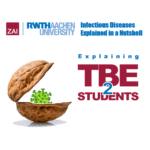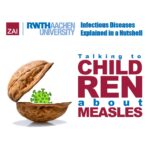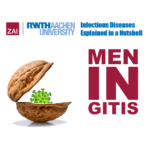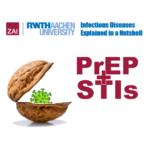Schlagwort: ‘Africa’
Traveling to Africa as a Gap Year Adventure: Understanding the Risk of a Meningitis

Source: pixabay
Disclaimer!
This article and its major media content are produced by students to train science communication as part of a lecture about human infectious pathogens. The article does not represent official advice from the authorities. For authorized information about the disease in question, please refer to the official health authorities in your country or the World Health Organization.
By Franziska Broeske and Yuko Tanabe
Thinking about going on an exciting gap year adventure to Africa? Exploring new cultures, wildlife, and stunning landscapes can be an incredible experience. However, it’s important to be aware of potential health risks, including meningitis, and take necessary precautions for a safe and unforgettable journey.
The Meningitis belt
Meningitis is a bacterial infection that affects the protective membranes surrounding the brain and spinal cord. In Africa, especially in the sub-Saharan region known as the „Meningitis belt“, meningitis is more common compared to other parts of the world. Moreover, it is important to stay informed about the current infections during your trip. Keep in mind that the dry season is the most dangerous, with the risk of an infection being significantly higher. When you are interested in the latest outbreak and how the government handles the recurring outbreaks, you can read the comment, “Meningitis outbreak in Nigeria: Nigeria’s Inadequate Response to Devastating Meningitis Outbreak”, published in the newspaper TERRA*. The author criticizes the Nigerian government during the latest meningitis outbreak between October 2022 and April 2023. The bacteria involved in this outbreak are primarily Streptococcus pneumoniae and Neisseria meningitidis, which cause meningitis in young adults.
Cause and symptoms of the disease
These specific bacteria, which cause meningitis, are primarily transmitted through respiratory droplets, often spread by coughing, sneezing, or close contact with an infected person. Places like hostels, public transportation, or social gatherings can increase the risk of exposure. It is important for you to recognize the symptoms (fever, headache, vomiting …) and to be informed about the risks of a meningitis infection. Therefore, we suggest the video “Human Pathogens: Meningitis” for you to learn key facts about the infection and what actually happens in your body when you are infected with Streptococcus pneumoniae.
—
Prevention of a meningitis infection
One of the most effective ways to safeguard against meningitis is through vaccination. Conjugate vaccines are available and recommended for travelers visiting high-risk areas, including sub-Saharan Africa. Consult a healthcare professional or a travel clinic well in advance of your trip to receive the necessary vaccinations and understand the recommended schedule. To find out more about bacterial meningitis and its prevention, listen to the interview with Dr. Mark van der Linden, the head of the reference laboratory for streptococci at the Institute of Medical Microbiology at RWTH Aachen University Hospital.
—
Additional advice for a safe trip
In addition to vaccinations and vigilance, maintaining a healthy lifestyle during your trip is important. A balanced diet, regular exercise, and sufficient rest can strengthen your immune system, reducing the chances of infection. Don’t forget to purchase comprehensive travel insurance that covers medical expenses, including emergency medical evacuation. Accidents and unforeseen circumstances can occur, and having adequate insurance will provide peace of mind throughout your adventure.
Traveling to Africa during your gap year can be a transformative experience. By understanding the risks associated with meningitis and taking proactive measures, you can fully embrace the beauty of the continent, immerse yourself in diverse cultures, and create lifelong memories. Remember, your health and safety are of utmost importance, so plan wisely, stay informed, and enjoy an incredible journey exploring the wonders of Africa!
* fictional newspaper
About the authors:
 Franziska Broeske
Franziska Broeske
Master student in Biology “Medical life science”
RWTH Aachen University
 Yuko Tanabe
Yuko Tanabe
Master student in Biology “Medical life science”
RWTH Aachen University
Ebola Outbreak: A Global Concern and Lessons Learned for a Resilient Future
Disclaimer!
This article and its major media content are produced by students to train science communication as part of a lecture about human infectious pathogens. The article does not represent official advice from the authorities. For authorized information about the disease in question, please refer to the official health authorities in your country or the World Health Organization.
By Kerstin Lehnen and Lena Rocca
Introduction
In recent headlines, the Aachener Newspaper has highlighted a concerning development – the reemergence of Ebola in the Democratic Republic of Congo. In this article, we embark on a journey to understand the historical context of the virus, particularly the devastating outbreak from 2014 to 2016. We will also delve into the current situation in Congo, exploring the characteristics of the Sudan Ebola virus responsible for the recent outbreak. Along the way, we will provide valuable resources, including an engaging video by science influencer SciFluencis* and an enlightening podcast hosted by Sciencefacts*. Get ready to uncover the global impact of Ebola and the invaluable lessons we’ve learned along the way.
The Devastating Outbreak of 2014-2016
Between 2014 and 2016, West Africa experienced the longest and largest Ebola outbreak in history. Originating in Guinea in December 2013, the virus rapidly spread across borders, resulting in over 28,600 reported cases and a tragic death toll of 11,325. Although Germany didn’t directly witness any cases, travelers infected with the virus introduced it to the country. Through international collaboration, enhanced disease surveillance, and effective treatment measures, the epidemic was eventually brought under control.
The Current Ebola Outbreak in Congo
On August 21, 2022, the Ministry of Health of the Republic of the Congo reported a new Ebola outbreak. Confirmed through rigorous medical tests, the outbreak persisted from August 21 to September 27, 2022, with 164 reported cases. Among them, 142 cases were confirmed, while 87 patients successfully recovered and 55 tragically lost their lives. The Sudan Ebola virus was identified as the cause, posing a challenge as there are currently no approved therapeutics or vaccines for this strain.
Unraveling the Sudan Ebola Virus
Belonging to a group of six Ebola virus species, the Sudan Ebola virus is a rare but life-threatening infectious disease. Originating in wild animals, the virus is transmited to humans through contact with infected animals. Human-to-human transmission primarily occurs through physical contact with Ebola patients or deceased individuals. The virus spreads mainly through bodily fluids, necessitating robust containment and prevention measures.
Expanding Your Knowledge
To gain a deeper understanding of Ebola and its implications, we recommend exploring additional resources. SciFluencis*, renowned science influencers, have produced a captivating video titled „What is Ebola?“ that offers an in-depth explanation of the virus:
—
Furthermore, in our quest to understand the global preparedness and response efforts, we turn to the enlightening podcast hosted by Sciencefacts*. In this thought-provoking podcast episode, hosted by Laura* and Julia*, university students in the field of infectious diseases shed light on the progression of an Ebola infection:
—
Conclusion
The resurgence of Ebola in Congo serves as a powerful reminder of the persistent threat posed by this deadly virus. Yet, by embracing international collaboration, bolstering disease surveillance, and advancing treatment and prevention strategies, we can strive to minimize its impact. Our collective commitment to learning from past outbreaks and staying informed through credible resources enables us to contribute to global efforts in tackling Ebola and safeguarding public health.
Let us remember that knowledge and awareness are our greatest weapons against infectious diseases like Ebola. By staying informed and working together, we can build a future resilient to such global health challenges. Stay informed, stay safe, and join us in our pursuit of a healthier world.
*fictious characters
About the authors:
 Lena Rocca
Lena Rocca
Age 23, 2nd semester Biology M. Sc., major: Medical Life Science
 Kerstin Lehnen
Kerstin Lehnen
Age 22, 1st semester Biology M. Sc., major: Neurobiology






